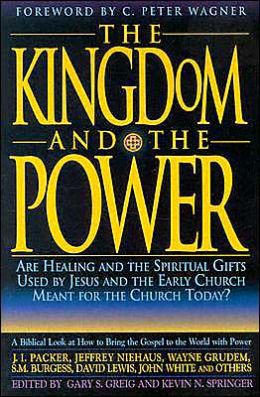Power Ministry In The Epistles
11 Space and time do not allow me to document this statement. I believe it is a fair summary of the progress of this movement, at least in the broadest strokes, in the United States in the present century [Editor’s note: this essay was copyrighted in 1993]. In contrast to some evangelicals, I personally have no hesitation in acknowledging the presence of true faith on the part of many Catholics and mainline Protestants. If my statement is fair, then it would be well for evangelical Christians to ponder its implications. My statement would suggest that, in the following order, the poor (who constituted the larger part of the pentecostal movement, at least initially), Catholics, and liberals (evangelical terminology for mainline Protestants) more readily recognized and made room for the renewing work of the Spirit of Jesus than did evangelicals. If this is true, then it suggests that there is something deeply wrong with the system of evangelical theology. It is unthinkable that a theological system could occasion an error of this magnitude while being otherwise unflawed. I make this observation humbly, for I was a part of the evangelical resistance to the Spirit for twenty years, though with decreasing fervor over that time period. It was only when the Lord granted me a deep emotional healing in 1985 that I was finally able to acknowledge what had already taken place within me gradually over the space of that twenty years, what Kraft has described as a shift in worldview (Charles H. Kraft, Christianity with Power: Your Worldview and Your Experience of the Supernatural [Ann Arbor: Servant, 1989], a book which is refreshingly candid about the author’s own struggles with the issues he addresses). I have recounted my change of conviction briefly in “Overtaken by Reality,” Ministries Today (March/April, 1992), p. 8.
12 See my essay “Sickness and Suffering in the New Testament” in Wrestling with Dark Angels: Toward a Deeper Understanding of the Supernatural Forces in Spiritual Warfare, eds. C. Peter Wagner and F. Douglas Pennoyer (Ventura: Regal, 1990), pp. 241-42 regarding the unfortunate treatment of tongues in pentecostal and charismatic circles. That Paul found it necessary in his first letter to the Corinthians to devote significant attention to correcting an overemphasis on tongues (1 Cor. 14) is suggestive that this gift may be especially subject to misuse. Even given this, however, he still concluded his discussion, as already mentioned, with a cautionary command that the gift be allowed to function, thereby indicating that the value of the gift is worth the effort required to keep it within its proper guidelines.
13 This aspect of the history of revivals is treated helpfully and discerningly in John White, When the Spirit Comes with Power: Signs and Wonders Among God’s People (Downers Grove: InterVarsity, 1988), especially in chapter nine, “How Safe is Spiritual Power?”
14 Clinton Arnold, Powers of Darkness (Downers Grove: InterVarsity, 1992).
15 Ken Blue, Authority to Heal (Downers Grove: InterVarsity, 1987).
16 Richard Foster, Prayer: Finding the Heart’s True Home (San Francisco: Harper Collins, 1992).
17 Michael Green, I Believe in the Holy Spirit (Grand Rapids: William B. Eerdmans, 1975).
18 Wayne Grudem, The Gift of Prophecy in the New Testament and Today (Westchester: Crossway, 1988).
19 See note 10 above; Charles H. Kraft, Defeating Dark Angels (Ann Arbor: Servant, 1992).
20 George Mallone, Those Controversial Gifts (Downers Grove: InterVarsity, 1983); id., Arming for Spiritual Warfare (Downers Grove: InterVarsity, 1991).
21 Ed Murphy, A Handbook of Spiritual Warfare (Nashville: Thomas Nelson, 1992).
22 David Pytches, Come, Holy Spirit (London: Hodder & Stoughton, 1985; published in North America as Spiritual Gifts in the Local Church, Minneapolis, MN: 1985); id., Set My People Free (London: Hodder & Stoughton, 1986).
23 Especially Peter Wagner, How to Have a Healing Ministry in Any Church (Ventura: Regal, 1988). See also by Wagner, Engaging the Enemy: How to Fight and Defeat Territorial Spirits (Ventura: Regal, 1991); Prayer Shield: How to Intercede for Pastors, Christian Leaders and Others on the Spiritual Frontlines (Ventura: Regal, 1992); Warfare Prayer: How to Seek God’s Power and Protection in the Battle to Build His Kingdom (Ventura: Regal, 1992).
24 See note 12 above.
25 Tom White, The Believer’s Guide to Spiritual Warfare (Ann Arbor: Servant, 1992).
26 Don Williams, Signs, Wonders, and the Kingdom of God: A Biblical Guide for the Reluctant Skeptic (Ann Arbor: Servant, 1989).
27 I am aware of stirrings in this direction in New England, on the northwest coast, and in the Austin area and know there are likely more of which I have not heard. I am hopeful to see such beginnings multiplied and integrated.
28 Apart from an unlikely variant in Col. 3:14.
29 I am grateful to Howard Hendricks for first calling my attention to the literal meaning of this phrase, as well as for many other valuable practical lessons.
Some Scripture quotations are direct translations by the authors and contributors. Scripture quotations, unless otherwise indicated, are from the HOLY BIBLE, NEW INTERNATIONAL VERSION (Copyright © 1973, 1978, 1984 International Bible Society, used by permission of Zondervan Bible Publishers). All italicized words and phrases in Scripture quotations are added by the authors for emphasis and clarification.

This chapter is from Gary S. Greig and Kevin N. Springer, eds., The Kingdom and the Power: Are Healing and the Spiritual Gifts Used by Jesus and the Early Church Meant for the Church Today? A Biblical Look at How to Bring the Gospel to the World with Power (Ventura, CA: Regal Books, 1993). Used with permission.


